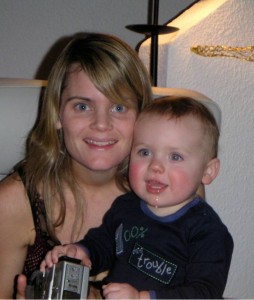A family from Hove are sharing their first-hand experience of meningitis and septicaemia during national Meningitis Awareness Week this week to ensure people are aware of the symptoms.
 International charity Meningitis Research Foundation estimates that meningitis and septicaemia affect approx nine people in the UK and Ireland every day. They are deadly diseases that can strike without warning, killing one in ten, and leaving a quarter of survivors with life altering after-effects ranging from deafness and brain damage to loss of limbs.
International charity Meningitis Research Foundation estimates that meningitis and septicaemia affect approx nine people in the UK and Ireland every day. They are deadly diseases that can strike without warning, killing one in ten, and leaving a quarter of survivors with life altering after-effects ranging from deafness and brain damage to loss of limbs.
Children under five and students are most at risk, but the diseases can strike at any age and not all forms are currently covered by vaccines.
Toby and Caroline Berryman said: “Our son Zach died of meningitis B septicaemia in 2005 and lost his fight for life within 12 hours. Zach had always been fit and healthy but one night he became poorly and irritable and had trouble sleeping. The next morning we noticed a tiny rash on his body.
“We called a doctor and Zach was rushed to hospital where doctors fought to save him. However despite every effort, the infection was too much for Zach and he died just hours after arriving in hospital.
“It was the speed at which it all happened which was hard to deal with, one minute we had a healthy happy boy and then he was gone.
“We are supporting Meningitis Awareness Week as everyone needs to know the symptoms so they can seek medical help fast.”
Christopher Head, Chief Executive of Meningitis Research Foundation adds: “We’re very grateful to Toby & Caroline for supporting Meningitis Awareness Week.
“Meningitis and septicaemia are diseases you never expect to happen but their personal experience really brings home how devastating these diseases can be and why it’s so important to be aware of the symptoms and be prepared to act fast when loved ones, family and friends fall sick.”
Vaccines have almost eliminated some types of meningitis but not all of them, children are currently vaccinated against Hib, MenC and 13 strains of pneumococcal meningitis. A MenB vaccine (Bexsero) was recommended for infants in the UK in March 2014 and is available privately but a timetable for implementation free of charge on the NHS is yet to be confirmed.
The UK Government has also introduced a new MenC booster campaign aimed at students starting university. GPs can administer the vaccine free of charge until 31 October 2014. The booster campaign will be repeated every year until 2017.
New students are at increased risk of encountering the bacteria that cause meningococcal disease because they are often living in busy halls of residence and in close contact with other new students during fresher’s week. Students should get immunised at least two weeks before they go away to study.









From the NHS website:
Signs and symptoms of meningitis
Anyone can get meningitis, but babies and young children under five years of age are most at risk. A baby or young child with meningitis may:
–have a high fever, with cold hands and feet
–vomit and refuse to feed
–feel agitated and not want to be picked up
–become drowsy, floppy and unresponsive
–grunt or breathe rapidly
–have an unusual high-pitched or moaning cry
–have pale, blotchy skin, and a red rash that doesn’t fade when a glass is rolled over it
–have a tense, bulging soft spot on their head (fontanelle)
–have a stiff neck and dislike bright lights
–have convulsions or seizures
The above symptoms can appear in any order, and some may not appear at all.
Don’t wait for a rash to develop. If your child is unwell and getting worse, seek medical help immediately.